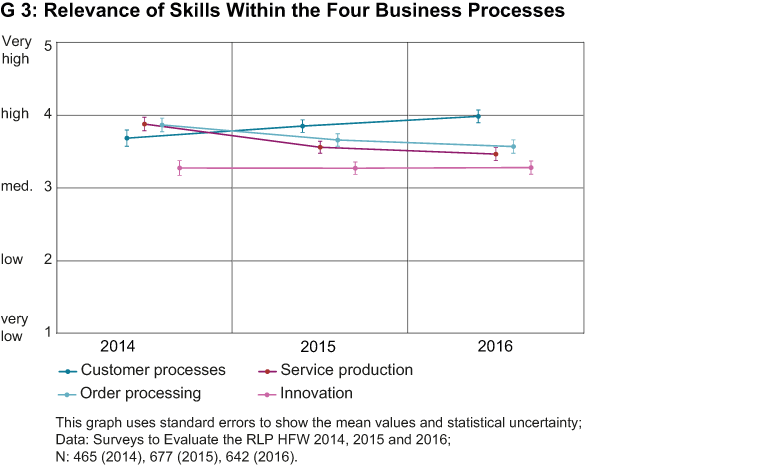Is the Framework Curriculum for Business Administration Studies at PET Colleges Up to Date?
- KOF Bulletin
- Vocational Education and Training
KOF is carrying out regular surveys among students and their employers to ascertain whether the Framework Curriculum for Business Studies at PET Colleges is still up to date.

Annual survey among students and employers
Part-time studies at a Swiss College for Professional Education and Training (PET Colleges) leading to a ‘dipl. Betriebswirtschafter/in Höhere Fachschule’ (HFW) [Advanced Federal Diploma of Higher Education in Business Administration] aim to turn the students, whose average age is 29, into ‘all-rounders with comprehensive, integrated and practical technical and management skills’. To assess the up-to-dateness of the framework curriculum of PET Colleges (RLP HFW), KOF is conducting an annual survey among last year students and their employers on behalf of the body responsible for the RLP HFW (consisting of representatives of HFW.CH, the Interessengemeinschaft Kaufmännische Grundbildung Schweiz (IGKG) [Interest Group Basic Commercial Training Switzerland] and the Kaufmännischer Verband [Commercial Association]). Over 1,800 prospective graduates of PET Colleges and around 230 employers have been interviewed in the context of the last three surveys in 2014, 2015 and 2016.
The study, which is based on the surveys, analyses the up-to-dateness of the RLP HFW by applying four groups of indicators: satisfaction with the studies, students’ expectations to their future labour market outcomes, relevance of acquired skills, and gaps in the framework curriculum (RLP HFW).
Satisfaction with the course remains high
In the first group of indicators, students provide information regarding their satisfaction with the course in general, with regard to its relevance to their current workplace responsibilities, and with regard to their future career. According to the results, the students are particularly satisfied with the course in regard of their future situation. This emphasises the significance of the course for all-rounder careers. Since none of the satisfaction indicators declined between 2014 and 2016, there is no indication that the RLP HFW is no longer up to date.
Students’ labour market expectations are stable
In the second group of indicators, students are asked about their expectations regarding future labour market outcomes. On average, 52 per cent of the students expect higher wages after graduation. In the employer survey, the response is even higher than this and has remained more or less unchanged in the period 2014-2016. The extent of the anticipated salary increase is substantial at 18 per cent. While students’ expectations have actually gone up in this area, employers’ expectations have declined. The proportion of students expecting a new position within three years of graduating with an Advanced Federal Diploma of Higher Education in Business Administration has remained stable at 59 per cent. In contrast, the employers’ results show a slightly negative trend which is not statistically sound due to the small sample.
Customer processes gaining significance
The third group of indicators examines the trend in the relevance of the skills specified in the RLP HFW. According to the results, the skills taught under the curriculum have not become any less relevant; however, shifts in relevance within and between various processes have been identified. For instance, the relevance of strategic (e.g. management processes), supporting (e.g. HR processes) and comprehensive (e.g. project management) processes has hardly changed. In contrast, there has been substantial change within the business processes (see G 3). Customer processes have gained relevance while service production and order processing have become less important. Innovation processes were the least relevant in all three years.
RLP HFW continues to provide comprehensive coverage
The fourth group of indicators analyses whether an increasing proportion of students and employers identifies any gaps in the RLP HFW. This is not the case.
The framework curriculum remains up to date
Thanks to a wide range of indicators, the study shows that the RLP HFW is generally up to date and meets the students’ needs. However, in future surveys, particular attention should be paid to expected labour market developments and the relevance of the different processes. This will help gain important information on the changing requirements students, and hence the PET Colleges, have to meet.
KOF Study No. 91 ‘Dritter Bericht zur Evaluation des Rahmenlehrplans für den Bildungsgang ‹dipl. Betriebswirtschafter/in HF›, Aktualität des Rahmenlehrplans und Wirksamkeit pädagogischer Instrumente' by Thomas Bolli, Ladina Rageth and Ursula Renold is available on our website (pdf, in German).
Contacts
No database information available
No database information available
No database information available
